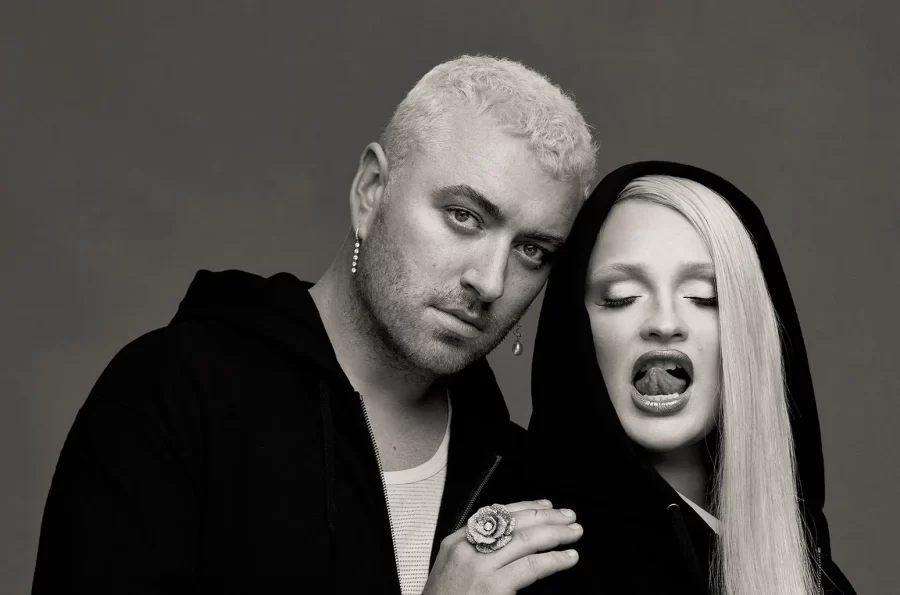“Unholy”: the gentrification of hyperpop
“Unholy,” the first veritable hyperpop mega-hit, largely eschews the creativity and queer themes that make hyperpop so good.
Driven by chronic internet usage, queer culture and copious amounts of Red Bull, the genre of hyperpop seemed like it was going to take over the world. The counter-cultural musical movement’s sound can be summarized simply by its name: eclectic, distorted and hyper pop. Since 2020, online hype has exponentially increased the genre’s popularity, and, in some ways, it looked like the renaissance of pop music’s creativity and experimentation.
But hyperpop’s first true smash hit, “Unholy” by Sam Smith and Kim Petras, can’t even manage to be interesting.
“Unholy” is a collaboration between Sam Smith, the pop artist most known for stagy, highly popular ballads like “Stay With Me,” and Kim Petras, a bubblegum pop singer who’s never ranked among the Billboard charts. It’s a minimalist song complemented by choral chants and a pair of raunchy verses about cheating. Its beat is built out of bassy synthesizers and programmed trap drums that are highly reminiscent of the off-kilter hyperpop sound, as well as the aforementioned chants on the chorus, which aren’t quite reminiscent of any recent popular music. In short, “Unholy” owes almost all of its sound to hyperpop. (And a little to the late Middle Ages.)
And yet, despite symbolizing massive success for the once-homegrown hyperpop, “Unholy” is a highly gentrified interpretation of the genre. It ignores all the most abrasive qualities of hyperpop and replaces the innovative producers that inspired it with the music industry’s premier hitmakers. Gone are the gloriously over-the-top Auto-Tuned vocals and noisy electronics of hyperpop’s past greatest hits, instead reduced to dissonant synths and a vaguely-quirky trap beat that feels too minimal to do anything substantive.
Despite its barebones instrumental, the song has half-a-dozen credited producers with illustrious, lengthy production discographies — but none from the hyperpop scene. Now, there’s nothing wrong with pop production veterans, but hyperpop is built on breaking pop music’s conventions, not conforming to them. “Unholy” is certainly left-field, but with anything that could be mildly challenging removed for social acceptability, the song feels molded to an algorithm. A certain genuineness is lost when music as spontaneous as hyperpop is molded to an algorithm — whether it be radio airplay or TikTok virality.
Perhaps because of its unwillingness to break convention, “Unholy” has far transcended the boundaries of hyperpop: “Unholy” was a #1 hit on the Billboard Hot 100 last month. It’s also the first time a song by an openly non-binary or transgender artist has achieved this status, let alone two on the same song — Smith is gay and identifies as genderqueer, while Petras is transsexual. This is far from unexpected from the hyperpop scene. Many of the genre’s key artists and fans identify as LGBTQ+, and hyperpop has been described as one of the only spaces in the music industry where queerness isn’t simply tolerated but actively embraced. But still, the sheer success of the song itself is astounding.
However, the only truly queer thing about “Unholy” is its context. The song itself tells of a distinctly straight relationship, even though Smith is gay, and it makes no references to queerness. While the song’s success is a victory for LGBTQ+ visibility in music, given the artists’ identities and the wider fraught situation surrounding gay and transgender rights, the decision to wipe the song of any queer undertones feels like a cop-out for mass marketability. Not that queer artists have to write every song about being queer, but for a highly-anticipated collaboration between two of pop music’s most celebrated LGBTQ+ stars to be this straight reeks of marketing strategy more than anything.
“Unholy” is the one thing that no hyperpop should ever be: inoffensive. It borrows from some of pop’s most forward-thinking concepts and makes them as innocuous and appealing as possible by wiping them of anything that could be objectionable (except to the handful of people that are still offended by moderate sexuality in music, I guess). A cheating anthem written by two trans artists in 2022, one of the most awful years for trans rights in this country’s recent memory, feels engineered to stir up drama, or at least to generate angry right-wing think pieces. Even 2020’s “WAP” provoked the anger of America by merely being raunchy. “Unholy” should be another perfect storm of controversy, but it can’t even achieve that since the song itself avoids being blatant enough about anything to provoke any sort of reaction.
Don’t get me wrong. Seeing two queer artists at the top of the charts, incorporating sounds from one of my favorite genres, makes me as happy as anyone. But the song itself is a significant letdown, to say the least. Because, despite the infinite promise and intrigue behind a hyperpop-inspired song made by Sam Smith and Kim Petras, “Unholy” manages to do nothing more than exist.




